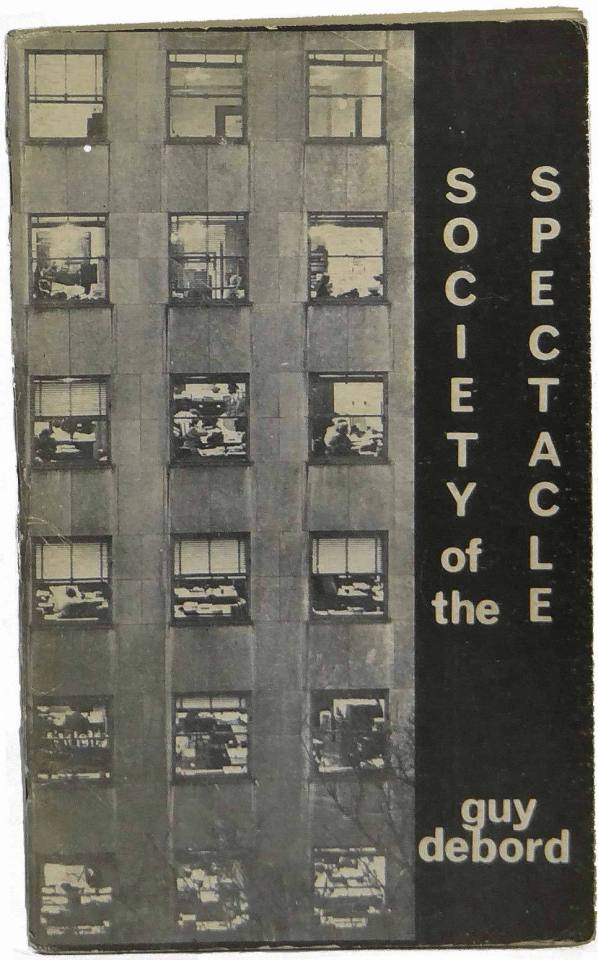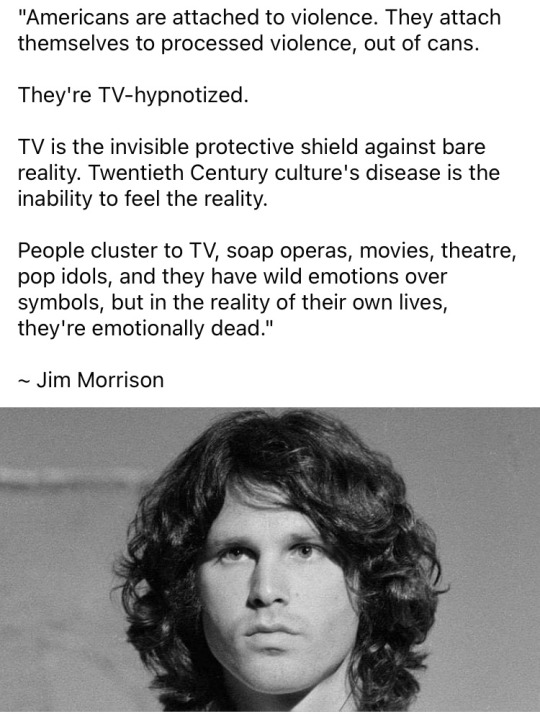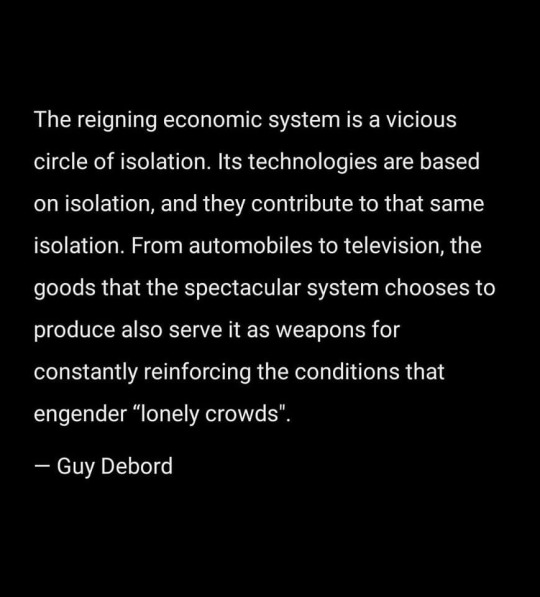#Society of the Spectacle
Photo







Guy Debord, La Société du Spectacle (1967, trans. Ken Knabb) // Nope (2022, dir. Jordan Peele)
4K notes
·
View notes
Quote
The illusory paradise that represented a total denial of earthly life is no longer projected into the heavens, it is embedded in earthly life itself.
Guy Debord, Society of the Spectacle
#reality#virtual#profane#sacred#world#paradise#spectacle#life#quotes#Debord#Guy Debord#Society of the Spectacle
159 notes
·
View notes
Text

Guy Debord - Society of the spectacle
33 notes
·
View notes
Text

back by popular demand
Society of the Spectacle (Donald Nicholson-Smith Translation) : Guy Debord : Free Download, Borrow, and Streaming : Internet Archive
#society of the spectacle#situationism#situationist international#guy debord#society#social control#control
37 notes
·
View notes
Text
Ideology is the intellectual basis of class societies within the conflictual course of history. Ideological expressions have never been pure fictions; they represent a distorted consciousness of realities, and as such they have been real factors that have in turn produced real distorting effects. This interconnection is intensified with the advent of the spectacle ─ the materialization of ideology brought about by the concrete success of an autonomised system of economic production ─ which virtually identifies social reality with an ideology that has remoulded all reality in its own image.
Guy Debord, from Society of the Spectacle (tr. Ken Knabb)
#guy debord#ken knabb#society of the spectacle#nonfiction#essays#translations#on ideology#on the spectacle#2022 reads
149 notes
·
View notes
Photo


“The more you consume the less you live,”
― Guy Debord
110 notes
·
View notes
Text
The most depressing thing is finding out how many of my students are still citing Elon Musk as if he's some kind of genius tech visionary and not an unstable manchild with billions of times more cash than brains who happens to own some tech companies. PR goes a long way.
38 notes
·
View notes
Text

8 notes
·
View notes
Quote
The spectacle in general, as the concrete inversion of life, is the autonomous movement of the non-living.
Guy Debord, Society of the Spectacle
81 notes
·
View notes
Text
”The erasure of personality is the fatal accompaniment to the conditions of existence that is concretely submissive to spectacular norms, and thus more separated from the possibilities of knowing experiences that are authentic and thus from the discovery of individual preferences. Paradoxically, the individual must permanently repudiate them if he wants to be respected a little in such a society. This existence postulates a fluid fidelity, a succession of continually disappointing commitments to false products. It is a matter of running quickly behind the inflation of devalued signs of life. Drugs help one to conform to this organization of things; madness allows one to flee it.”
Guy Debord, The Society of the Spectacle
15 notes
·
View notes
Text

La société du spectacle, G. Debord, 1967
#guy debord#la société du spectacle#society of the spectacle#ludwig feuerbach#the essence of Christianity#sociology#philosophy#society#modern society#modernity#capitalism#consumerism#reading#read in 2023#book quotes#mailmiocuoredipietratremaancora
2 notes
·
View notes
Text
"I often joke about how being a monk is my ultimate calling, but asceticism seems too easy a pillar to attach myself to. Maybe the awareness that I have sought from Headspace sessions and running over the years was housed in the presence that comes from the cessation of a constant performance for strangers. The search for a good life ‘out there’ was a cop-out of the good life everywhere around me. And even if four months is too early to celebrate this new way of seeing, so be it. If we're not supposed to dance, why all this music?"
— celebrating early and the search for a good life
#social media#quitting social media#asceticism#monkhood#performance psychology#substack#substack writer#substack newsletter#substack posts#creative writing#on living#the little things#writers on tumblr#gregory orr#society of the spectacle#guy debord#philosophy#philosophy of life
3 notes
·
View notes
Text
The agent of the spectacle who is put on stage as a star is the opposite of an individual; he is as clearly the enemy of his own individuality as of the individuality of others. Entering the spectacle as a model to be identified with, he renounces all autonomous qualities in order to identify himself with the general law of obedience to the succession of things. The stars of consumption, though outwardly representing different personality types, actually show each of these types enjoying equal access to, and deriving equal happiness from, the entire realm of consumption. The stars of decision making must possess the full range of admired human qualities: official differences between them are thus cancelled out by the official similarity implied by their supposed excellence in every field of endeavour.
Guy Debord, from Society of the Spectacle (tr. Ken Knabb)
#guy debord#ken knabb#society of the spectacle#nonfiction#essays#translations#on celebrity culture#on consumerism#2022 reads
103 notes
·
View notes
Text
The Hell Without Poetry
I started reading Proletarian Nights by Jacques Rancière, about contradictory aspirations held by artisanal workers in early 19th century France. One of the most interesting points so far are the fact that some workers had a culture of emulating bourgeoise fashion and not saving money, both to differentiate themselves from the domestic servants they felt they were superior to, and to signal that they deserved the same privileges as the bourgeoisie but rejected capitalist ethics of accumulating in order to exploit others.
I’ve just gotten into the famous Gauny section, where Rancière goes off an a tangent about this philosophical joiner (someone who makes wooden building components). The first of his books I read was The Ignorant Schoolmaster, which similarly takes up a single historical figure in order to develop their ideas into a universal, ahistorical frame by blending his voice with theirs. I find the idea really interesting, and it makes me wonder if I could do the same for the people I interviewed for my dissertation. I like how it deconstructs the boundary between historical actor and theorist, emphasising that all people are both, but it only works of course if the people you’re quoting are doing a substantial amount of philosophising. I also don’t want to lose marks for a stylistic gambit.
One of Gauny’s ideas is that work is work, always demeaning no matter what its content is. Rancière points out that this is similar to the philosophy of a preacher at the time, who valorised work for its essential self-sacrifice (Max Weber pricks up his ears), because it allows our body to fulfil its debt created by the wage given by the employer. This is obviously ideologically beneficial to the status quo because valuing just particular aspects of work rather than work it and of itself would suggest that those parts should be expanded i.e. that work can be better or worse and might be improved.
However, Gauny twists the message by separating the effect it has on the body from the effect on the soul. He admits that there is a pleasure to physical self-sacrifice - even though hard work of the sort he was doing can have awful long-term consequences, there’s pleasure in the oblivion you can reach in the arduous routine of it - but he emphasises that it kills the soul by not giving you breathing time to sit and contemplate, discuss ideas, and make art. There’s a beautiful section where Gauny says
“Ah, Dante, you old devil, you never traveled to the real hell, the hell without poetry!”
This speaks to the ideas at the heart of Rancière’s entire project: that everyone aspires to critically engage in the arts, and that the extent to which do is not overdetermined by class position. His project in this book in particular is to demonstrate that there is no pure working class - there is frequent infighting within and between professions and genders, and their morality is often inspired by the bourgeoisie.
In fact, one of the most interesting parts is that many of the workers start seriously questioning the status quo only after they’re visited by bourgeois do-gooders, but rather than take on the ideas of these champagne socialists uncritically, they use them to inspire new ideas. Rather than expecting a new world to come from one place, we should recognise that novelty is always a result of the melding of difference. It actually makes me think of the fact that so many of the progressive ideas developed in Europe, from Rousseau to Marx, were inspired by Native American philosophies (David Graeber & David Wengrow’s book, The Dawn of Everything, has a great section on the possible influence on Rousseau).
The aspirations of people like Gauny to write poetry, to come up with new ideas based on a variety of sources, was largely unrecognised or dismissed when Rancière wrote this in the ‘80s. He was frustrated that not only did capitalists view working people as beneath of that sort of thought, but Marxists saw it as counter-revolutionary and therefore unbecoming. Rancière was disillusioned with Althusser, who’s structuralist Marxism he saw as not leaving any space for people to resist their circumstances, instead being overdetermined by class. I don’t know Rancière’s stance on free will, but as a rather dogmatic determinist even I find that frustrating, as if we aren’t influenced by so much else which can give rise to disruptive convergences. Basically, people are more complicated than that! Any supposedly emancipatory philosophy with a single vision of what the working-class should be is doomed to failure, as Rancière well knew from witnessing the dismissal of the student protests of ‘68 be dismissed as “not real revolution”.
Rancière saw in Gauny a way out of this structuralist trap, where by taking on the high-minded ideas of the more romantic bourgeoisie and reinterpreting them with a personal need to act against the system, new ideas could be created and used to disrupt the distribution of the sensible, or the matrix of acceptable ideas - most important of which was the idea of who is capable of having such ideas. This concept is actually where my name comes from!
I wonder if we’re losing this time to contemplate even more today, with the spectacle invading so much of our lives - social media being the quintessential example. This is not such a danger if we’re using it to chat to people, but if we’re just scrolling… there’s not much thinking going on there. 😅 Guy Debord, in the ‘50s, was already talking about capital colonising our everyday life, and this stealing of attention, our time to think and talk and create and have ideas, seems to be the worst consequence of it.
#jacques rancière#marxism#karl marx#david graeber#capitalism#alienation#philosophy#social theory#sociology#history#france#french history#poetry#dante#work#equality#social media#guy debord#spectacle#society of the spectacle
3 notes
·
View notes
Photo


28 notes
·
View notes
